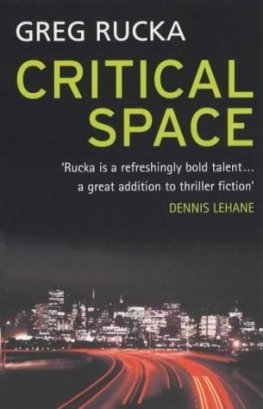Greg Rucka - The last run
Here you can read online Greg Rucka - The last run full text of the book (entire story) in english for free. Download pdf and epub, get meaning, cover and reviews about this ebook. genre: Detective and thriller. Description of the work, (preface) as well as reviews are available. Best literature library LitArk.com created for fans of good reading and offers a wide selection of genres:
Romance novel
Science fiction
Adventure
Detective
Science
History
Home and family
Prose
Art
Politics
Computer
Non-fiction
Religion
Business
Children
Humor
Choose a favorite category and find really read worthwhile books. Enjoy immersion in the world of imagination, feel the emotions of the characters or learn something new for yourself, make an fascinating discovery.
- Book:The last run
- Author:
- Genre:
- Rating:3 / 5
- Favourites:Add to favourites
- Your mark:
- 60
- 1
- 2
- 3
- 4
- 5
The last run: summary, description and annotation
We offer to read an annotation, description, summary or preface (depends on what the author of the book "The last run" wrote himself). If you haven't found the necessary information about the book — write in the comments, we will try to find it.
The last run — read online for free the complete book (whole text) full work
Below is the text of the book, divided by pages. System saving the place of the last page read, allows you to conveniently read the book "The last run" online for free, without having to search again every time where you left off. Put a bookmark, and you can go to the page where you finished reading at any time.
Font size:
Interval:
Bookmark:
Greg Rucka
The last run
For Tara Chace, it was the fall that did it, the absurdly long pause that came between missing the handhold and slamming into the ground. Like all falls that are too far, this one lasted long enough for her to realize what had happened, and what, as a result, would inevitably happen next. It was a moment of perfect clarity; not of vision, but of self-awareness, and Chace saw herself then as she had only four other times in her life. She saw herself as the woman she was-frankly, honestly, without self-pity, judgment, or false modesty. Who she was, who she had been, and who she wished to be.
Then she hit the ground, her back impacting first, followed almost immediately by her skull. The first such moment of clarity had occurred when she was only ten years old, the day her mother, Annika Bodmer-Chace, informed Tara that, come the spring, she would be attending a boarding school in Cheltenham, England, and would no longer be living in Switzerland with her mother and father. The conversation-if it could be called such-had occurred in the sitting room of the Geneva house, with Chace seated in a chair so large it had threatened to swallow her, and her mother on her knees before her, speaking gently and sweetly in French, holding both of her child's hands in her own as she imparted the news. When Chace looked past her mother and out the window, she could see snow falling with a sedate grace.
"For your education," her mother told her with the same, bright smile that made men and women alike wonder what other sweet lies and promises it concealed. "You must be educated like a proper lady."
"Like you?" Chace asked.
The smile broke wide, Annika laughing. At thirty-four, she was a near-perfect mirror for the woman Chace would grow to become, the same golden blond hair and sky blue eyes, strong and fine-boned. The only marked difference were in the first creases of age in her flawless skin, lines made by laughter that Chace would never share.
"No," Annika said. "A proper lady."
The understanding had been sudden and complete then. The cascade of dueling infidelities between her mother and father had reached its breaking point. Chace knew they were separating, and understood that divorce would follow, that it would be ugly, that it would be brutal, and that her mother would never, ever change. She saw in her mother a vision of herself as she might be, selfish and spoiled and utterly oblivious to the pain she inflicted upon others, a woman-child who would never grow up.
Which meant Chace was going to have to, and quickly. The second of such moments occurred when Chace was twenty-two, in her last year at Cambridge but down to London for a long weekend with a group of her peers, amongst them the only one she called a friend, Rachel Beck. This was in the days on the cusp, after the Cold War but before the Global War on Terror, before the Firm had been reduced to advertising openly for new recruits. For two years, Chace had been vetted with deliberation by SIS's talent-spotters at the university until, finally, assured of her loyalties, intelligence, and potential, she had been invited the night before to a discreet-read: secret-meeting in a cramped office situated in the basement of one of London's finer hotels. Chace, who had long since developed a strong suspicion of what was really going on, had attended the meeting, in part to assure herself she'd been correct, but mostly because the secrecy and deception involved had appealed to her.
Arriving for the interview precisely at twenty minutes past three in the afternoon, Chace had found an empty room, two chairs, a table, and a tea set on the sideboard. Touching the pot with the back of her hand, she'd found it scalding hot. She'd ignored the refreshment, taken a seat, smoked a cigarette, and had begun contemplating smoking another when a small and rather sad-looking man entered the room. He made no apology for keeping her waiting, and Chace had liked that, because, of course, she'd understood the delay as intentional. She was certain she'd been followed to the meeting, and would've been surprised if she hadn't been under surveillance within the room itself.
The man gave his name as Mr. Smith, and producing a file from his bag, he proceeded to relate a comprehensive and remarkably thorough accounting of her life up to and including that very day. Everything was laid bare in the most clinical fashion: her family, her friendships, her education, her vices, her lovers, her indiscretions, including one or two that Chace herself had tried to forget. It was a recitation of facts, devoid of all judgment but her own.
Then Mr. Smith had said, "There are those who feel you could be of great service to your country, if you chose to dedicate yourself in such a direction. I speak, Miss Chace, of a lifetime of service, of challenge and sacrifice that will be known to only a very few at the highest levels of Government. It is a life without public recognition, without common reward, but it is, at its heart, greater and more vital. A secret life, to be sure, but one where what you do and say can-not to overstate it-alter the course of history."
Mr. Smith had paused, perhaps to give Chace the opportunity to speak, but she didn't take it. After several seconds, with no change of his expression, he continued.
"Very few people are invited to this calling. Of those who answer, even less actually succeed. You could be one of them."
Chace remained silent.
"Certainly, this is not a decision to be made with haste," Mr. Smith said. "By the same token, it is not one that can be indulged. An answer is required before midnight Sunday."
Chace nodded, smiled, whereupon Mr. Smith recited a phone number for her to remember. If she was interested, she was to call the number and say that she was staying in London for the week. If not, she needn't bother to call.
She left Mr. Smith in the basement, making her way on foot to meet Rachel and the others near Sloane Square, struggling with her thoughts. By the time she reached them, though, she had come to a decision: she would forget Mr. Smith and his phone number, along with everything else he'd said. There was an appeal to the offer, to be sure, and it wasn't a fear of failing that restrained her; she had no doubt that, of those few who were called, she would certainly be one to succeed. But it was that same vanity, ultimately, that held her in check.
She loathed, with passion, the idea of being anonymous.
The dinner that evening had been a typically indulgent affair, catty and gossip-laden, lubricated with alcohol, which Chace enjoyed, and a smattering of recreational drugs, which she eschewed. This was followed by dancing and more drinking at a string of clubs, all of them deemed fashionable for one reason or another. Rachel, unlike Chace, was nouveau riche, and while her father had substantially more money than any number of them put together, to the Sloanes she was not, and never would be, one of them, try though she might, and try heroically she did. While no one was ever overtly unkind to Rachel's face, as soon as her back was turned the knives promptly emerged to carve out a hundred imaginary faults and sins.
To Chace, who'd met Rachel her first year at boarding school and now had known her for over a decade, it was painful to behold; her friend, desperate to believe that she had been accepted, only to be reminded again and again that she would never belong; while at the same time, Chace herself was welcomed with open arms through no effort of her own, simply an accident of birth.
At two in the morning, stumbling into cabs outside of yet another too dark and too loud dance club, Rachel had doubled over vomiting, apparently sick drunk, much to the amusement and relief of Chace's fellow Sloanes. Chace was urged to send Rachel home in a cab so that the party might roll on to its next port of call.
Font size:
Interval:
Bookmark:
Similar books «The last run»
Look at similar books to The last run. We have selected literature similar in name and meaning in the hope of providing readers with more options to find new, interesting, not yet read works.
Discussion, reviews of the book The last run and just readers' own opinions. Leave your comments, write what you think about the work, its meaning or the main characters. Specify what exactly you liked and what you didn't like, and why you think so.







